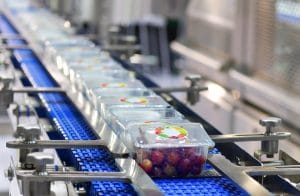 Thermal management has different implications in different industries, so improved thermal management can take on a wide variety of forms. For example, in the food and beverage industry, thermal management includes common electrical cooling processes, such as cooling electrical enclosures and control panels, and more vital processes that are directly associated with the production process. In most cases, the use of advanced heat exchangers helps food and beverage companies streamline all of their thermal management processes, enhancing their productivity and efficiency while lowering their operating costs in several areas.
Thermal management has different implications in different industries, so improved thermal management can take on a wide variety of forms. For example, in the food and beverage industry, thermal management includes common electrical cooling processes, such as cooling electrical enclosures and control panels, and more vital processes that are directly associated with the production process. In most cases, the use of advanced heat exchangers helps food and beverage companies streamline all of their thermal management processes, enhancing their productivity and efficiency while lowering their operating costs in several areas.
Where thermal management matters in the process
There are many different processes in food and beverage manufacturing that rely on thermal management in some form, and the common need to cool electrical equipment is an important one. These days, many of the most competitive companies rely on technology virtually every process, and keeping technology running efficiently requires implementing an advanced electrical cooling system. In addition to cooling enclosures, however, thermal management is also vital to processes like pasteurization, as well as the safe packaging and shipping of perishable products. In many of these applications, heat exchangers provide an optimal level of thermal management at minimal cost, and can substantially boost a company’s overall productivity.
How heat exchangers make thermal management better
Modern heat exchangers can handle a wide range of thermal management capabilities, but their most common is the ability to rapidly remove heat from electrical enclosures. Heat exchangers use eco-friendly cooling fluid to absorb electrical waste heat in a highly efficient manner. Then, it transfers the heat so that it can’t cause damage to sensitive electrical parts. This same process of absorbing and rapidly heat can also be used for more than just electrical cooling. For instance, using appropriately chilled cooling fluid, some heat exchangers can make processes like pasteurization and temperature-controlled packaging and storage much more cost and energy efficient.
Benefits heat exchangers bring food & beverage companies
The specific ways in which heat exchangers enhance any given process depend on the process itself. However, the innovative heat transfer principles and eco-friendly methods that heat exchangers utilize make them highly beneficial to most processes in several important ways. For instance, by transferring electrical waste heat instead of chilling it, like more traditional solutions, heat exchangers help companies save significant amounts of energy and avoid having to interrupt operations for repairs. For more information about what better thermal management means for food and beverage companies, call Noren Thermal Solutions in Taylor, TX, at 866-936-6736.







